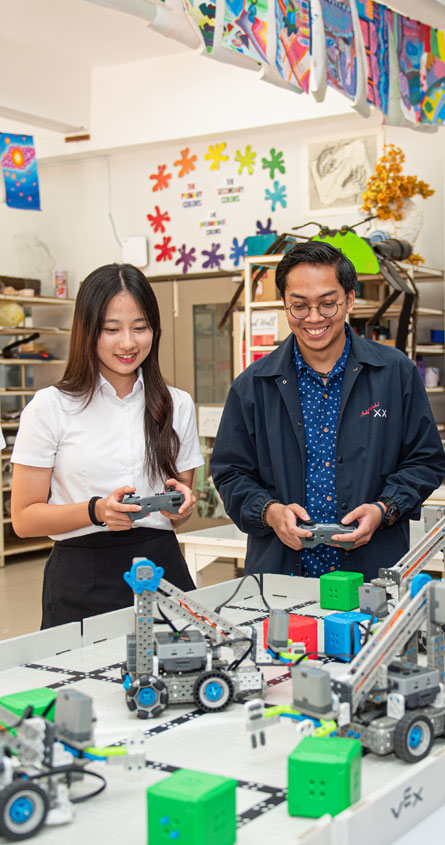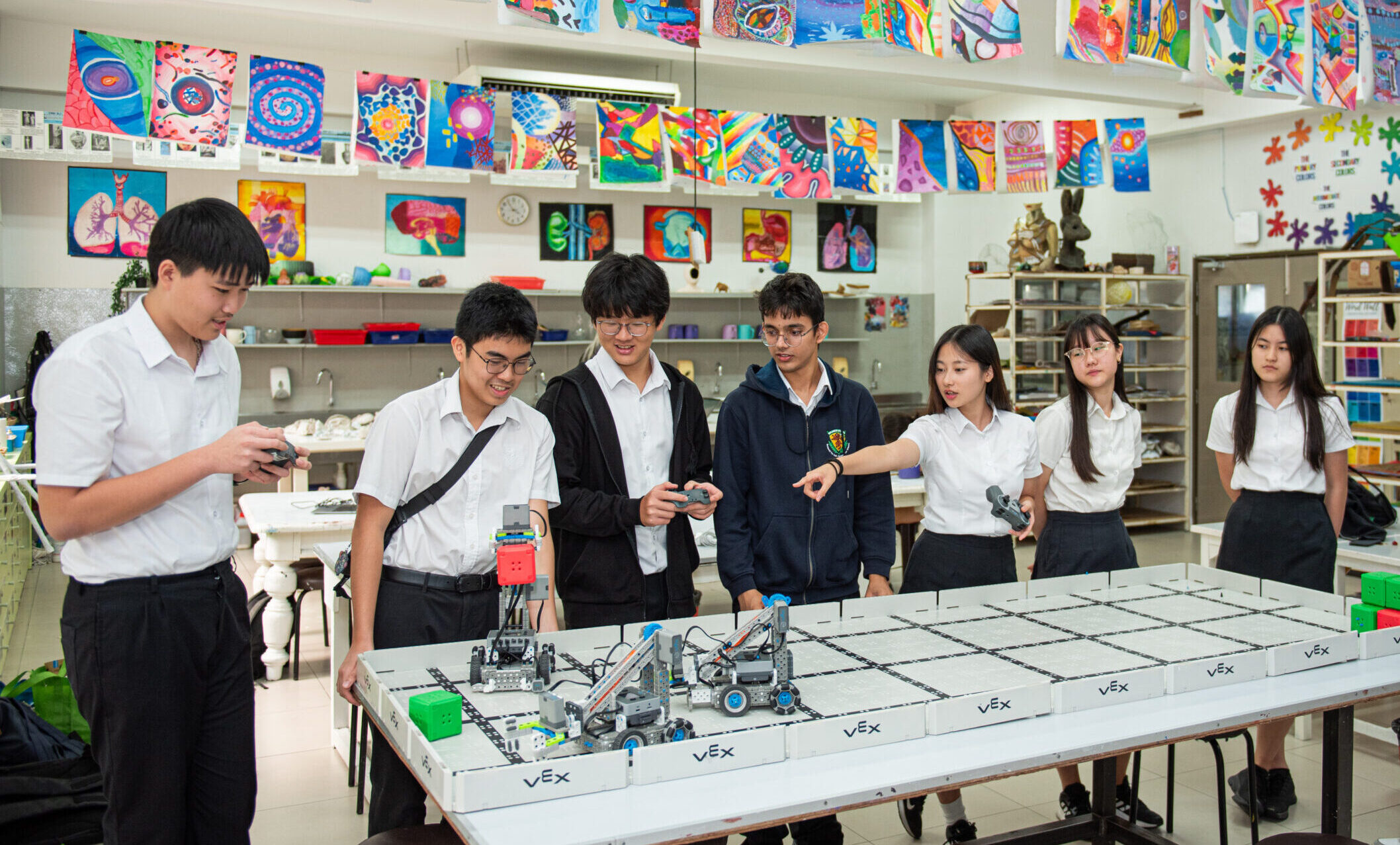
Introduction (What is it?)
The International Baccalaureate (IB) Diploma Programme (DP) is a rigorous two-year educational program aimed at students aged 16 to 19. It is recognized and respected by leading universities around the world. The program encourages students to be knowledgeable, inquiring, and compassionate individuals who help to create a better and more peaceful world through intercultural understanding and respect.
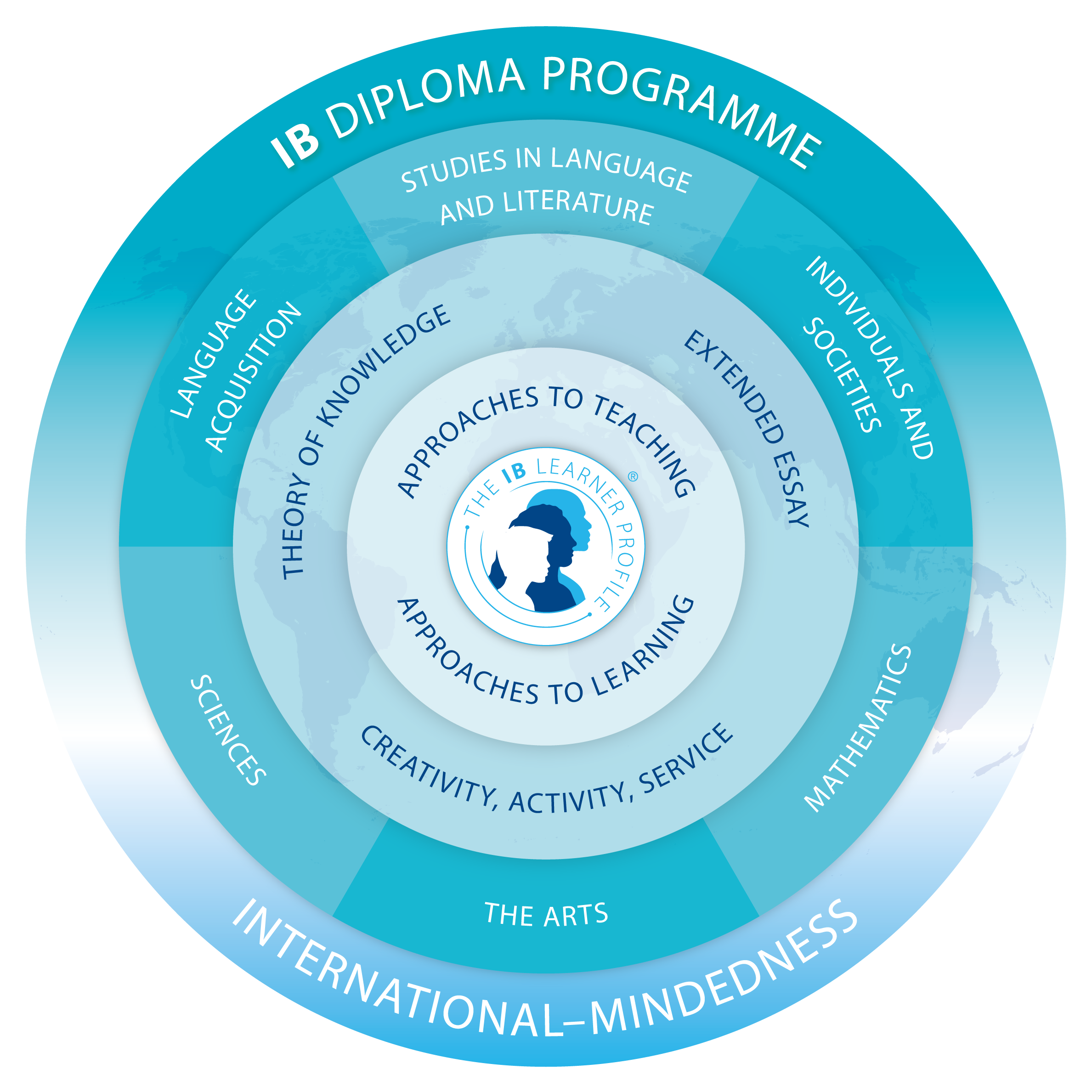
The core components of the IB Diploma Programme are:
1. Theory of Knowledge (TOK):
A course designed to encourage students to reflect on the nature of knowledge and on how we know what we claim to know.
2. Extended Essay (EE):
An independent, self-directed piece of research, finishing with a 4,000-word paper. This provides practical preparation for undergraduate research and an opportunity for students to investigate a topic of special interest to them.
3. Creativity, Activity, Service (CAS):
Requires students to take part in a range of activities that involve creative thinking, physical exertion, and community service. CAS encourages students to engage in activities beyond the academic curriculum.
Students must choose six subjects from six subject groups: Studies in language and literature; Language acquisition; Individuals and societies; Sciences; Mathematics; and The arts. Students can opt to take an additional science, individuals and societies, or languages course instead of a course in the arts.
Students may choose to take two studies in language and/or literature courses and be eligible for the highly regarded Bilingual Diploma. This recognises an individual’s ability to not only communicate at the highest level in multiple languages but also highlights linguistic and cultural awareness. This is a qualification that is highly sought after by Universities around the world, giving individuals a competitive edge and global academic recognition.
The subjects are taught at higher level (HL) and standard level (SL), with HL comprising 240 teaching hours and SL comprising 150 teaching hours. Students are required to take at least three (but no more than four) subjects at a higher level, and the remaining at a standard level.
The IB Diploma Programme is known for its academic rigor and its holistic approach to education. It aims not only to provide students with a broad and balanced education but also to instill in them the skills and attitudes necessary for success in higher education and beyond, including critical thinking, research skills, and a global mindset.
Philosophy and Approach: The Uplands Way
At Pre-University (Years 12-13) level, Uplands proudly offers its students the opportunity the embark on the International Baccalaureate Diploma Programme (IBDP). The gold standard in Pre-University education, the IB Diploma is for students who recognise that the world is changing very quickly in lots of different ways and that they want to be ready for it. The IBO motto “Education for a better world” encompasses the internationally-minded nature of the IBDP. It gives students the skills and knowledge to be future influencers.
In essence, the IBDP is not a narrow, career-focused preparation; it is deliberately broad and focuses on using higher-order thinking skills such as evaluating, analysing, and synthesising. This programme is considered the best preparation for University study by many of the best universities around the world. Ultimately, the programme is about so much more than just the grades received at the end of it.
“IB is well known to us for excellent preparation. Success in an IB programme correlates well with success at Harvard. We are always pleased to see the credentials of the IB Diploma Programme on the transcript.” Marilyn McGrath Lewis, Director of Admissions at Harvard University.
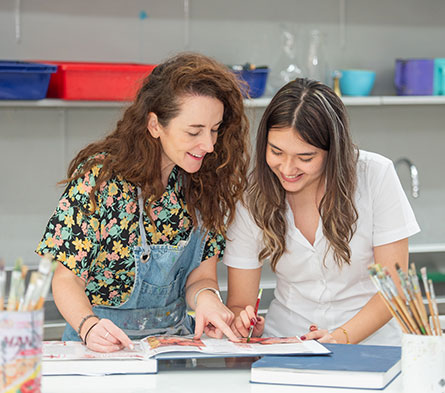
IBDP Subject Combinations for Career Pathways
Whether the students are enrolled in the DP or enrolling in several DP subjects, it is important to know which subject selections will help students achieve their goals and career aspirations.
Our university careers counsellor can help students make subject selection decisions. Mr. Muir knows what universities in different countries will look for and what combination of standard level (SL) and higher level (HL) courses students should take to be eligible for admission to university. Students are also encouraged to check admission requirements with individual universities.
SL and HL courses differ in scope but are measured according to the same grade descriptors, with students expected to demonstrate a greater body of knowledge, understanding, and skills at the higher level. Each student takes at least three (but not more than four) subjects at a higher level, and the remaining at a standard level.
If you would like some examples of subject combinations, please take a look at these examples of diploma subject choices.
The Engineer (STEM Focus)
- Studies in language and literature: English A: Language & Literature HL
- Language acquisition: French B SL
- Individuals and societies: Economics HL
- Sciences: Physics HL
- Mathematics: Analysis and Approaches HL
- The arts: Visual Arts SL (or none, if double Group 4 chosen)
The Creative (Arts & Design)
- Studies in language and literature: English A: Literature SL
- Language acquisition: Mandarin B HL
- Individuals and societies: Psychology SL
- Sciences: Design Technology HL
- Mathematics: Applications and Interpretation SL
- The arts: Visual Ars/Theatre HL
- Extended essay: VA/Theatre or Design Tech
The Medic (Standard Path)
- Studies in language and literature: English A: Language & Literature HL
- Language acquisition: Spanish B HL
- Individuals and societies: Psychology SL
- Sciences: Biology HL, Chemistry HL
- Mathematics: Analysis and Approaches SL
- The arts: NONE
- Extended essay: Biology or Chemistry
The Social Scientist
- Studies in language and literature: English A: Language & Literature HL
- Language acquisition: French B SL
- Individuals and societies: History/Economics/ Geography SL
- Sciences: Computer Science SL
- Mathematics: Applications and Interpretation SL
- The arts: (Optional) Visual Arts or Film
- Extended essay: Economics
The Business Professional
- Studies in language and literature: English A: Language & Literature HL
- Language acquisition: Mandarin B HL
- Individuals and societies: Business Management HL/Economics SL
- Sciences: Design and Technology SL
- Mathematics: Analysis and Approaches SL
- The arts: Film or Visual Arts SL
- Extended essay: Business Management or Economics
The Linguist
- Studies in language and literature: English A: Language & Literature HL,
- Language acquisition: Spanish B SL
- Individuals and societies: History SL
- Sciences: DT/Computer Science SL
- Mathematics: Applications and Interpretation HL
- The arts: Music SL or Film SL
- Extended essay: Spanish
Diploma Programme (DP) Subject Selection
Uplands offer a wide variety of DO subject choices. Students usually pick one subject from each group to build their programme. Students can choose to replace Group 6: The Arts with another science subject. In addition, students wishing to achieve the Bilingual Diploma may take two Language A courses from Group 1 and not select a Language Acquisition in Group 2. If students are taking English B in Group 2, they must take a different Language as a Language and/or Literature course in Group 1.
A tentative subject choice for the DP ( provided the minimum number of student interests is four):
GROUP 1
- English Language and Literature A SL / HL
- English Literature A SL/ H
- Chinese Language and Literature A SL/ HL
- Malay A Language and Literature A SL/ HL
- Language A: Literature Self-taught (SL)
GROUP 2
- English B HL
- French B SL/ HL
- German B SL/ HL
- Spanish B SL/ HL
- Chinese B SL/ HL
- Spanish ab initio (SL)
GROUP 3
- Economics SL/ HL
- Geography SL/ HL
- Psychology SL/ HL
- History SL/ HL
- Business Management SL/HL
GROUP 4
- Chemistry SL/ HL
- Biology SL/ HL
- Physics SL/ HL
- Computer Sciences SL/ HL
- Design and Technology SL/ HL
GROUP 5
- Mathematics: analysis and approaches SL
- Mathematics: analysis and approaches HL
- Mathematics: applications and interpretation SL
- Mathematics: applications and interpretation HL
GROUP 6
- Film SL / HL
- Music SL/ HL
- Theatre SL/ HL
- Visual Arts SL/ HL
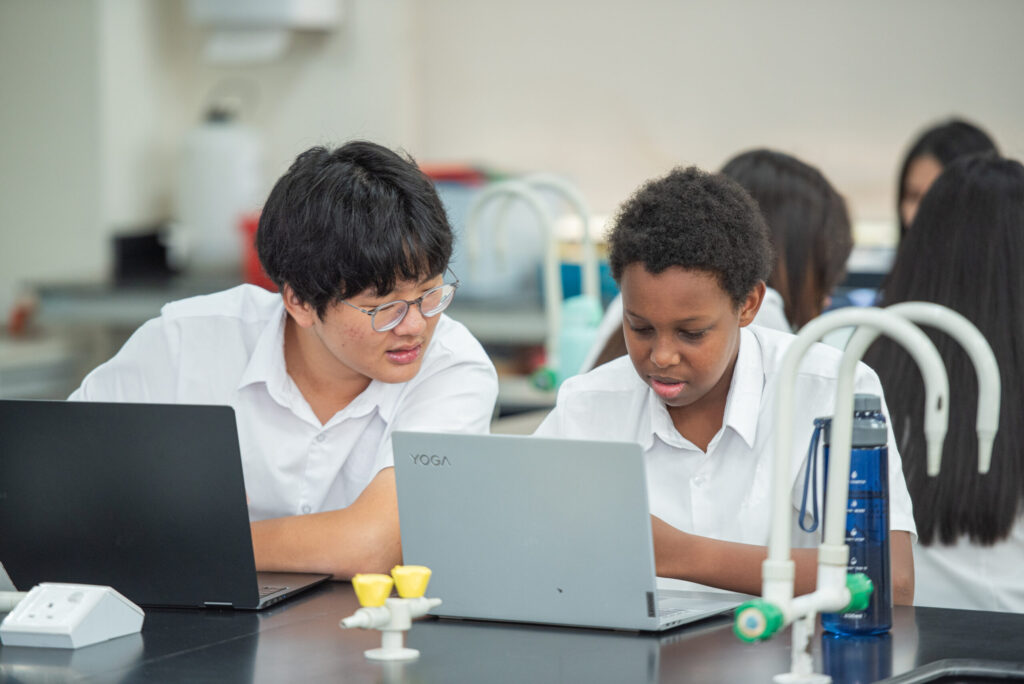
Student Experience
The International Baccalaureate (IB) Diploma Programme offers a comprehensive and rigorous educational experience that cultivates critical thinking, global awareness, and holistic development in students. With its emphasis on inquiry-based learning, interdisciplinary studies, and international-mindedness, the IB Diploma Programme equips students with a broad range of skills and knowledge necessary for success in the 21st century. Beyond academic excellence, the programme fosters traits such as resilience, cultural sensitivity, and a commitment to lifelong learning, preparing students to navigate diverse cultures and contexts with confidence. Through its emphasis on community service, extracurricular activities, and the development of the learner profile attributes, the IB Diploma Programme not only fosters academic achievement but also nurtures well-rounded individuals who are equipped to contribute positively to society and thrive in an increasingly interconnected world.
As a result of their time in the IB, students develop:
- Time management skills and a strong sense of self-motivation
- A keen interest in civic engagement
- Notable academic ability
- Strong research and writing skills
- Critical thinking abilities
- An International outlook.
Research suggests, for example, that IB students are more likely than their peers to complete their undergraduate degrees and pursue graduate work, and that they are more likely to be engaged in various aspects of university life.
According to the research, IB students are strong in:
- Student leadership activities
- Working with university faculty on research projects
- Finding opportunities to study in other countries
- Tutoring other students
- Taking part in voluntary and community service
- Completing internships.
In order to maximise the opportunities for IB students at their institutions, many universities and colleges develop recognition policies, making it clear how IB students gain places on their courses.
You can find model recognition policies for universities on the IB website.
Learn more about how to attract IB students to your institution.
(IBO, 2024)
